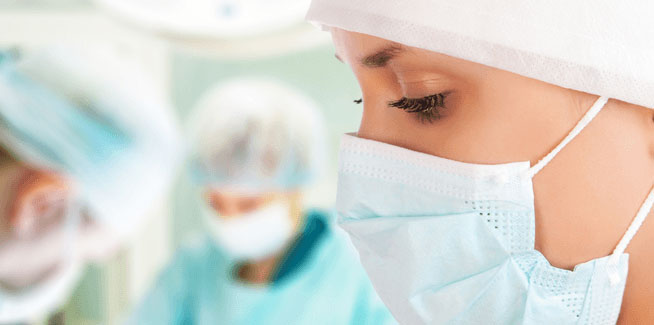If your doctor has referred you for a medical test to find out what is going on inside your body, there are things to know and information about endoscopy procedures you will need. You will also need information about preparing for an endoscopy and the risks involved.
What is endoscopy?
Endoscopy allows your gastroenterologist to see your body’s internal organs such as stomach or colon for a proper diagnosis of your symptoms and treatment options.
All about endoscopy – What is it? Why is it needed? What’s involved?
The specialist uses an endoscope, which is a lengthy flexible tube with a video camera at one end and controls on the other end. The endoscope tube is lit by bundles of tiny optical fibres to light up and magnify the area under investigation.
During an endoscopy, the gastroenterologist inserts the end of the endoscope with the tiny camera lens attached into whichever area of your body is the focus of the investigation – for the stomach and oesophagus e.g., it is inserted via your mouth. The video camera sends the magnified images back to a television screen so your doctor can see what is happening in that area.
What’s involved in an endoscopy procedure?
There are various kinds of endoscopic procedures available for specialist doctors to diagnose diseases, abnormalities and conditions that otherwise would require major surgery to find.
Why do you need it?
The endoscope is inserted in the following areas for the following reasons:
- Gastroscopy – via your mouth to inspect your oesophagus and stomach
- Colonoscopy – via your anus to inspect your large bowel
- Bronchoscopy – via your mouth to see your airways and lungs
- Capsule endoscopy – you are given a capsule to swallow. It has a tiny camera and light source inside, to transmits images of the digestive system wirelessly
Preparing for an endoscopy
You will need to go through a preparation process, depending on which endoscopy you will be undergoing – for an endoscopy to investigate the stomach and oesophagus you have to fast for a certain amount of time beforehand.
For a colonoscopy e.g., you will be prescribed a bowel preparation to drink in the days before the procedure. Your endoscopy doctor will clearly explain how to do this and information will be provided with the preparation for each step. If you are unsure, always ask your doctor for more information.
To help you relax, you will be ‘sedated’ or anaesthetised with special medication for an endoscopic test, and you will not feel or remember your endoscopy .
However, since you will be having an anaesthetic or sedative, you won’t be able to drive yourself home afterwards, so you need to arrange things so someone can to pick you up and help you to get home.

What You Should Know Before Booking an Endoscopy Appointment
What should you do before endoscopy? The information about endoscopy procedures and what you should do beforehand should include the finding out about the doctor’s and hospital’s accreditation, quality and safety standards. Other things you should know include how much experience your doctor has had in performing endoscopies, the level of expertise and experience there is in the gastroenterologist’s staff and what the process will cost. You will also need to know preparation instructions for your endoscopy procedure.
Accreditation, Quality and Safety Standards of the Hospital or Clinic
The Australian Commission on Safety and Quality in Health Care has a program called the Australian Health Service Safety and Quality Accreditation (AHSSQA) Scheme. Under the scheme, all public and private hospitals and day procedure centres must have accreditation.
The assessments are carried out by independent agencies which are approved by the Commission. To make sure the centre, day hospital or clinic you are booking for your endoscopy has accreditation, call and check with them.
Experience and Expertise of Your Doctor
Every medical procedure and medication has certain risk factors to take into account. This is why you need to make sure the doctor or gastroenterologist you choose for your endoscopy has the expertise and experience to carry out the work as risk-free as possible.
Possible endoscopy risks
Endoscopies are usually very safe, but there is always a very small risk of:
- adverse reaction to sedation
- bleeding (particularly if polyp is removed)
- a tear or perforation
- infections
Costs of Endoscopy Procedure
The cost of endoscopy procedures in Australia is generally covered by Medicare but there may be an additional out-of-pocket expense. However, if you have private health insurance you will be fully covered (depending on level of cover and excess) and can have the endoscopy in an accredited Day Hospital or clinic such as Direct Endoscopy.
Level of Clear Communication & Guidance on How to Prepare For Your Endoscopy Procedure
The level of clear communication and guidance on how you should prepare for your endoscopy should be high, so if you are even the slightest bit unsure about something, call your specialist endoscopy doctor and check it out. If he or she cannot explain it clearly, find another practitioner.
What should you do after an endoscopy?
After your endoscopy is completed the nursing staff will monitor you in the recovery area until the sedative or anaesthetic has worn off. If you need pain relief or any additional medication it will be supplied tp you. And as mentioned, you will need help (or carer) to get back home. You will have fully recovered by the next day but if you have serious side effects you should consult your specialist or GP.
If you’re searching online for quality “endoscopy doctors near me” then don’t scroll past Direct Endoscopy in Melbourne. For more than 20 years we have provided quality endoscopy services and specialist treatment.
Today, Direct Endoscopy is one of Australia’s largest providers of endoscopy services. We have five Day Hospitals in the Melbourne metropolitan area and our team of specialist gastroenterologists is committed to providing the highest quality endoscopy expertise. Call us today on 9781 5959 to make a booking.
- When to get a colonoscopy, why you need one and how it all works - November 22, 2021
- Why Your Doctor Wants You to Get a Colonoscopy - October 12, 2021
- Why Australia’s Bowel Cancer Screening Age Should Be Lowered to 40 - July 23, 2021

